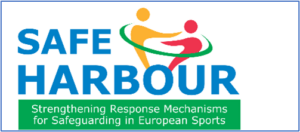Asser Institute is pleased to be a partner in the new Erasmus+ Project named “Strengthening Response Mechanism for Safeguarding in European Sports” (SAFE HARBOUR), which is coordinated by the European Olympic Committees EU Office (EOC EU Office). This initiative is dedicated to enhancing safeguarding mechanisms across European sport, creating safer environments for all.
About Asser Institute

Established in 1965, the “T.M.C. Asser Instituut” is an internationally renowned centre of expertise in the fields of public international law, private international law and European law. It conducts fundamental and independent policy-oriented research and organises critical and constructive reflection on international and European legal developments, at the interface of academia, legal practice and governance. The institute actively disseminates its knowledge through publications, training programmes, conferences and free events.
The work of Asser Institute on safeguarding to date
The Asser Institute has a long history of working on sports and sport law and governance, through its well-known International Sports Law Centre and widely read Asser International Sports Law Blog. Asser Press, its in-house publisher, is the publisher of the International Sports Law Journal and of the International Sports Law book series. Every year, the Centre together with the International Sports Law Journal organizes an annual conference for researchers and sport lawyers. The topic of sport and human rights has become an integral part of the conference programme in the last 7 years. These initiatives are led by senior researcher Antoine Duval, who is an international expert on transnational sports law and governance.
Since 2021, the Asser Institute’s expertise in sport has expanded to cover also sport and human rights, and activities include the organization and delivery of trainings and courses on sport and human rights, such as the annual summer course on sport and human rights, or the advanced programme on safe investigations of cases of abuse in sport. This training has been delivered in cooperation with the Centre for Sport and Human Rights in two editions, to an international group of participants from sport bodies, player associations, sport lawyers, and athlete representatives.
Further activities in this space are guest lectures at various universities in the Netherlands and other European countries and publishing academic articles as well as other studies and policy briefs on sport and human rights and related topics. This work is mainly led by Daniela Heerdt, researcher at the Asser Institute, and consultant in the space of sport and human rights for almost a decade.
The role of Asser Institute within the SAFE HARBOUR project
The Asser Institute participates in this project as one of the expert partners based on its comprehensive expertise in European and international human rights law. Specifically, the Asser Institute is responsible for assessing the developed contents against European and international (human rights) law, including the assessment of the classification of safeguarding concerns and the European Response framework against human rights, contributing to delivering thematic seminars, supporting the NOCs in setting up tailor-made strategies, and assessing their compliance with the relevant law. In addition, based on the institute's experience in developing educational formats on sport and human rights, it is also going to inform the pedagogical content, structure and delivery of the training on safeguarding, particularly in relation to human rights and the legislative framework.
Background information on the SAFE HARBOUR project
The SAFE HARBOUR project, short for “Strengthening Response Mechanisms for Safeguarding in European Sport”, is a 30-month project co-funded by the European Union through the Erasmus+ Sport Programme 2024. Coordinated by the EOC EU Office, the consortium includes Thomas More and Asser Institute as experts on safeguarding, human rights and law, 2 International Federations (International Biathlon Union and International Ice Hockey Federations), and 20 National Olympic Committees (Belgium, Bosnia and Herzegovina, Croatia, Cyprus, Czechia, Denmark, Germany, Hungary, Kosovo, Latvia, Lithuania, Luxembourg, Malta, Montenegro, Norway, Poland, Portugal, Romania, Slovakia and Slovenia). Additionally, the International Olympic Committee (IOC) is involved as an outside resource.
The project seeks to strengthen the capacity of European NOCs and Federations to address safeguarding concerns by identifying gaps, developing a European Response framework, and fostering collaboration. This framework will be adapted to national contexts, complemented by training and awareness initiatives to enhance safeguarding measures at both national and European levels. Therefore, SAFE HARBOUR aims to equip partner NOCs and Federations with the tools and confidence to implement effective safeguarding measures while establishing a robust support network for Safeguarding Officers and laying the groundwork for a future IOC Regional Safeguarding Hub.

![]()
